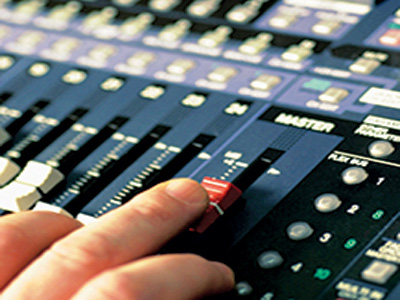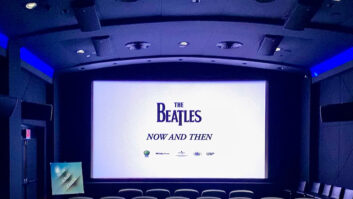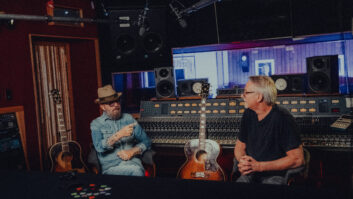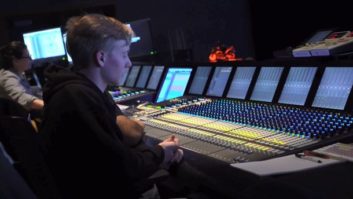
Imagine this scenario: A major label takes delivery of drives containing the recording data for one of its artists’ new albums. On them are Pro Tools session files, but no accompanying information about which musicians played on the various songs or who the engineers were.
Prior to the album’s release, someone from the label’s pared down and overworked administrative staff will have to reach out to the production team to try to get the missing session information. But this might happen weeks or months after the production was completed, so the crediting information about the musicians and engineers who worked on the project could very well be incomplete. As a result, those whose credits slip through the cracks stand to lose both the intangible benefit of being publicly credited for their work on the project, and, potentially, royalties they might accrue from its digital use.
In today’s recording industry, more and more of the earnings on the publishing and musician side are calculated from the digital delivery of music, including from streaming services, and satellite and Internet radio. Individual streams or plays on those media generate payouts in fractions of a penny, also known as “micropayments.”
“We need to have accurate and transparent systems to account for, collect and distribute all of the fractions of cents from around the world that are due,” says Maureen Droney, Managing Director of The Recording Academy Producers and Engineers Wing. “That’s the kind of business we’re in now. Various factions of the industry are working on this, but we don’t yet have all of the infrastructure in place.”
As more and more of the earnings are generated from these digital sources, it’s in the interest of all the parties involved—labels, producers, engineers and musicians—to have proper crediting, and that all starts with reporting session metadata correctly.
DIFFERENT NEEDS
It’s in everyone’s interest that the correct information from the session data gets accurately reported and safely stored. That said, stakeholders in the industry need it for different reasons.

Maureen Droney, Managing Director of The Recording Academy Producers and Engineers Wing.
The monies earned for performances on non-interactive digital radio services such as Pandora, Internet radio, satellite radio and Spotify mobile webcasting are not administered by conventional performing rights organizations like ASCAP and BMI, which represent songwriters. Instead, they are the province of SoundExchange. It collects the royalties and is required by law to pay the featured artist 45 percent, rights owners (which are often the record labels) 50 percent, and non-featured artists (other musicians and singers on the recording) 5 percent. Producers are also paid, via a letter of direction with the artist, that designates their share and that SoundExchange administers.
Featured artists and rights owners are more likely to have sufficient administrative support to get their due from SoundExchange. But background musicians and singers are less likely to, in part because of incomplete crediting. What’s more, even when they have been properly credited, many don’t even realize that they are due money.
In addition to Sound Exchange, there are several other funds that pay musicians for digital plays. These include the Film Musicians Secondary Markets Fund, the Sound Recording Special Payments Fund, and the AFM & SAGAFTRA Fund. These funds have money sitting in them waiting to be paid out once the musicians who are due digital royalty payments can be correctly identified.
Proper crediting also helps creatives build their reputations and expand their work opportunities. “How producers and engineers traditionally got work was from people knowing what they had done previously,” says Droney. “We went from album artwork to little CD covers to flimsy digital booklets. Now, there’s generally nothing. So how do people find out who worked on a song?”
For the record labels, it’s essential from a business standpoint to have the session metadata correct before putting out an album or song, particularly for making correct back-end payments. Labels are also responsible for credits that may be on the CD jacket or in some digital format that accompanies downloads. As stated, labels also frequently get “rights owners” payments from SoundExchange for Internet usages.
Although digital music service providers such as Spotify and iMusic generally don’t display credits beyond the song and artist’s name for songs they’re playing, the availability of accurate metadata offers the potential for the addition of premium tiers for subscribers in which the credits for musicians, singers, producers and engineers are displayed. Many people believe that streaming services would also benefit from the increased music discovery options for fans who get greater access to complete session metadata.
At the present time it can be very difficult to get correct album credits that include all the musicians, producers and engineers for each song. Many of the consumer-oriented online databases, such as AllMusic, don’t necessarily have access to that kind of comprehensive and accurate information. In addition, credits transferred from CD jackets have to be manually typed in (aka “re-keyed”), so there’s always the chance of errors being introduced.

John Spencer, President of VeVa Sound
THE BACK STORY
The need for standardization of session data (both metadata and actual audio files) was foreseen as far back as 2002. “The labels knew that something was wrong,” says John Spencer, president of VeVa Sound in Nashville, and one of the key individuals working on the development of data standards for the music industry. “They were continuing to get these cardboard boxes full of mixed media, raw hard drives, CDRs, DAT tapes, etc., and didn’t have any idea what was coming in.”
A working group was formed that included a number of record labels, Spencer, the Recording Academy and others, to try to find a way to create standards for digital delivery of session data.
In 2006, the Library of Congress got involved, offering Spencer’s company, then called BMS/Chace, grant money to help with the creation of an XML “schema,” for the collection of recording metadata. (A schema is set of instructions in the XML programming language that specify where certain types of data must be placed. In other words, it provides a group of standardized fields for the entry of specific data.)
Also in 2006, a nonprofit consortium called DDEX, which stands for Digital Data Exchange and whose mission is “standardizing the digital supply chain,” was formed. Since then, DDEX has published several standards pertinent to the record industry. Notable examples include: ERN (Electronic Release Notification), which provides commercial information for releases; and DSR (Digital Sales Report), giving digital service providers a standardized way to report sales figures to labels and PROs.
RIN IS IN
In 2010, the Library of Congress and BMS/Chace donated the intellectual property created for their joint project to DDEX and a studio metadata working group was formed by DDEX members to begin the work of creating a recording metadata standard.
This standard was realized when, on October 10, 2016, DDEX released RIN (Recording Industry Notification), which is specifically designed for standardizing recording metadata and contains fields for such information as where the song was recorded, who the musicians, producers and engineers were and what their ISNI (International Standard Name Identifier) numbers are.
“RIN will facilitate crediting, ensuring that performers, producers and recording engineers are properly identified and paid for their contributions,” said Droney in DDEX’s RIN press release.
“It is the underpinning for collecting that studio data through a digital audio workstation,” Spencer says about RIN. “You can collect studio metadata to a Web browser or a standalone app, and you could then export an XML doc that’s structured, standardized and ready to go.”
The RIN standard can be licensed from DDEX at no cost, and could easily be incorporated into DAWs. That would give engineers and producers the ability to open a dialog box within a Pro Tools session and enter in all session information—including who the musicians and engineers were—in a RIN-compliant format that could easily be read by others.
While it might seem desirable to be able to write metadata directly into audio files, the current limitations of the header in a Broadcast Wave file make that impractical, and the data is easily corrupted as it travels between DAWs. So, the RIN information is designed to be saved separately from the audio files, and exported as XML data.
Using the RIN XML code, it’s also possible to set up a browser-based collection tool, which can take the information at the session and send it directly to a database. Spencer mentioned one such app that VeVa Sound is developing called Studio Collect. “I can enter my performer and the related pertinent information,” he says, “and once I do, I don’t have to enter it again. What instrument he played, what his role was, what part it was on each song.”
THE ISSUES
Even with industry-wide adoption of the RIN standard, there are other roadblocks to overcome in terms of universal sharing of the data.
First, producers and engineers need to get onboard with the idea of scrupulously entering the session data. This shouldn’t be too hard to achieve, considering that virtually all parties involved stand to gain from it, but it might take some time for it to become an accepted part of the session workflow.
Another issue is verification. “Obviously the data being input is key to success,” says Spencer. “So if we had a system where there’s a cloud database where you can park your RIN metadata, who’s validating that? Otherwise, couldn’t I just put in that I’m the fifth Beatle? So, there are concerns about the verification of that data.” Record labels have traditionally been responsible for verifying this information, and third-party companies such as VeVa Sound are also being employed by the major labels for verification purposes.
That said, the RIN standard can help to make collecting and saving recording metadata relatively simple. All of the metadata entered for the session is contained in a small, easy-to-send file. Once RIN becomes accepted throughout the industry, it should speed the process of data sharing up considerably, helping facilitate more revenue for artists and the labels. It will also eliminate the considerable expense and potential errors involved with re-keying metadata.
According to Spencer, the ideal is to have a system that integrates session metadata with payments in an automated fashion. “At the end of the day, as an industry, we need to be looking for solutions that work in scale, because we can’t have human intervention when we’re talking about fractional pennies being paid on streams. The payment modality has to be essentially ecommerce to ecommerce to ecommerce—all machine-made.”

Christy Crowl, founder and CEO, ProMusicDB
THIRD-PARTY SOLUTIONS
ProMusicDB, a database for musicians and other creatives that features verified session- credit information, is one of several third-party companies that offer their own solutions to the crediting issue. According to Christy Crowl, founder and CEO, “Our target customer or member of ProMusicDB is the studio musician or even producer whose credits are all over the place. IMDB says one thing, AllMusic says another, Discog says another. They themselves start to lose track, and they don’t have a place to put it all together.”
ProMusicDB is based on a paid membership model ($97 per year). Each member gets a profile page to list credits, which can be viewed, but not modified, by the public. Crowl says the aim of the service is to “empower the artists into this chain of data, which they’ve never really been a part of, regarding either getting credit or having a verification mechanism in place that can really comprehensively tell the story of a musician.”
A unique identifier is assigned to each member, and ProMusicDB uses other music industry organization memberships (such as PROs and AFM locals) help with “disambiguation,” that is, finding the right musician when there are multiple ones with the same name. For example, if there are 10 guitarists named John Smith, SoundExchange likely won’t have the information to know which is the right one to pay for a particular song. That’s where ProMusicDB’s ability to disambiguate will help.
Crowl says that the ID system they use “can help SoundExchange more accurately identify people that need to be paid, which then can help the union, which then can possibly help the PROs later on.”
Another third-party company, Jaxsta, is due to launch a database of verified music credits in 2017. The plan is to have paid clients, “Partners,” that will include labels, PROs, musicians, producers and other creatives. Consumers will be able to search the database for free, but, unlike the partners, will have no editing privileges.
According to founder and CEO Jacqui Louez Schoorl, credits will come “from the liner notes sent to us by our data partners. Currently, we’re working on a giant identity recognition and disambiguation engine to allow us to correctly identify who is who.”
Schoorl says that the engine will “allow us to gather a huge range of credit information and process it, so we can track down verified credits for musicians, instead of them having to make their own edits.”
According to the Jaxsta website, “By sourcing data from multiple authoritative sources, and then having real humans review anomalies, we are ensuring our data is as close to perfect as possible.”
GOOD CREDIT
In the uncertain and constantly changing new world of the digital music industry, the issue of studio metadata is clearly one that’s getting a lot more attention. RIN is an important addition to the toolset, but for progress to continue, various parts of the chain—including workstation manufacturers—must start incorporating RIN-compliant data entry into their products. In addition, producers and engineers must embrace the idea of devoting some of their time to comprehensive session-level credit entry.
It will probably take a lot more time and effort to get to an automated, ecommerce-based system that integrates metadata and payments, like what John Spencer is hoping to see, but reaching that point is a worthwhile goal for the industry.







